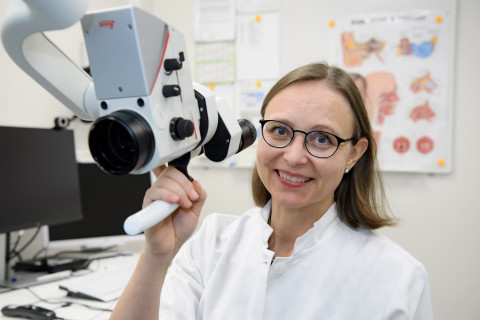A respiratory disease exacerbated by NSAIDs remains somewhat a mystery to researchers
One in ten Finns has asthma. A lesser known but equally common disease is chronic rhinosinusitis, an inflammation of the nasal and paranasal sinuses.
“In roughly half of patients, these co-occur,” says Sanna Salmi, Professor of Ear, Nose and Throat Diseases.
Some patients have a particularly severe form of the disease, a combination of asthma, chronic rhinosinusitis and NSAID-exacerbated respiratory disease. NSAIDs refer to non-steroidal anti-inflammatory drugs.
“This respiratory disease, which is exacerbated by NSAIDs, develops in early adulthood and is for life. NSAIDs significantly exacerbate patients’ symptoms of asthma, but avoiding these drugs won’t necessarily cure the disease, either.”
The severe disease form often involves chronic rhinosinusitis with nasal polyps, where mucosal protrusions, i.e., polyps, congest the nasal cavity and paranasal sinuses.
For many years already, this constellation of diseases has been a focus of Salmi’s research at the HUS Skin and Allergy Hospital. This August, she was appointed as Professor of Ear, Nose and Throat Diseases at the University of Eastern Finland in Kuopio, which makes Kuopio University Hospital an important partner for future collaboration.
“One of the goals is to carry out extensive treatment studies in Kuopio and to involve pharmaceutical companies interested in testing new pharmacotherapies in patients. We have an excellent setting for clinical trials that bring benefits to patients and yield resources for operational development.”
In an ongoing study, Salmi aims to shed light on the pathogenesis of the NSAID-exacerbated respiratory disease.
“We don’t yet fully understand how hypersensitivity to NSAIDs develops. It’s not an allergy in the traditional sense. The goal is to identify risk factors that could be used to predict the severe disease form. By addressing these risk factors, disease progression could be slowed down or even prevented.”
“We have also experimented with desensitisation to NSAIDs, but only a small proportion of patients benefited slightly.”
However, the treatment of severe asthma and chronic rhinosinusitis with nasal polyps is constantly moving forward.
“Biological drugs for these diseases have also become available, and it is important to study them not least because of the unique genetic heritage we Finns have. Finding a cure remains a goal to be reached.”
Early treatment improves the prognosis of tongue cancer
Another key focus of Salmi’s research is tongue cancer, which carries a high risk of mortality despite the advances made in its treatment.
“Early detection and early treatment improve the prognosis, so it is very important to ensure that for example medical students get good tools for detecting tongue cancer already in their basic training. The treatment of tongue cancer in Finland – Kuopio University Hospital included – is among the best in the world.”
Together with the research group of Ahmed Al-Samadi, a recently appointed Associate Professor of Oral Pathology, Salmi intends to use tumour samples to study tongue cancer. Cell and tissue models derived from these samples can be used to find new biomarkers that are indicative of the prognosis, and to investigate the sensitivity of different tumours to different treatments.
“This will hopefully enable more individualised and better targeted treatments in the future.”
Salmi emphasises that patients are always asked for their consent.
“It takes time for research results to be implemented in patient care, but it is very likely that sample donors will benefit during their lifetime.”
Ear, nose and throat diseases are a broad entity and, according to Salmi, Kuopio is home to solid expertise in them.
“Here, I myself will be able to focus on the wider development of the field.”
“Kuopio University Hospital houses a strong research cluster related to ear surgery and hearing, which is built upon the long-term work of Associate Professor, Deputy Chief Physician Aarno Dietz. My own research also has many links to pulmonary diseases, and collaboration with Professor of Pulmonary Diseases Heikki Koskela is being planned.”
On the Kuopio Campus, the university’s various fields of research and the university hospital’s clinics are located just a stone’s throw away from each other and this, according to Salmi, brings basic research closer to clinical research in patients.
“A fine setting for education in ear, nose and throat diseases has been created here. My goal is to make sure this education stays relevant and to provide students with up-to-date, even changing, information.”
At the university, Salmi is responsible for ear, nose and throat diseases, as well as for the field of phoniatrics, and she also gives lectures to students of logopedics, i.e., to future speech therapists.
Sanna Salmi
- Professor of Ear, Nose and Throat Diseases, University of Eastern Finland, 1 August 2023–
- Lic. Med., University of Helsinki, 1998
- MD, University of Helsinki, 2000
- Specialist in Ear, Nose and Throat Diseases, University of Tampere, 2006
- Title of Docent in Ear, Nose and Throat Diseases, University of Helsinki, 2013
Key roles
- Specialist in Ear, Nose and Throat Diseases, Deputy Chief Physician and Research Group Leader, HUS Skin and Allergy Hospital, 2011–2023
- Postdoctoral Researcher, University of Amsterdam, 2004, and University of Helsinki and University of Tampere, 2001–2013
- Research Group Director, University of Helsinki, 2013–2023
- Specialist in Ear, Nose and Throat Diseases, central hospitals of Päijät-Häme and Kanta-Häme, and Hyvinkää Hospital, 2008–2011
For further information, please contact:
Professor Sanna Salmi, sanna.salmi(a)uef.fi, +358447172508, https://uefconnect.uef.fi/en/person/sanna.salmi/



